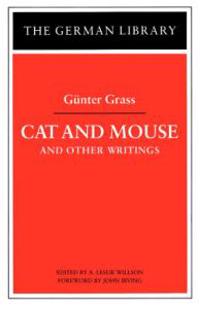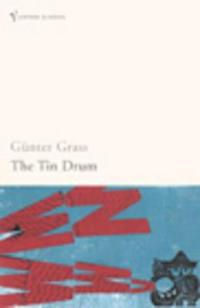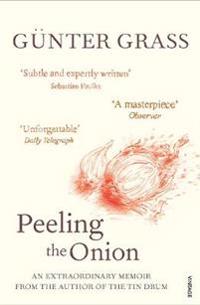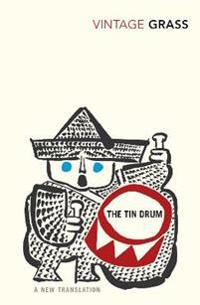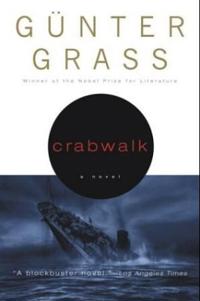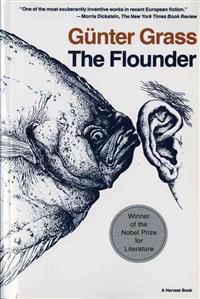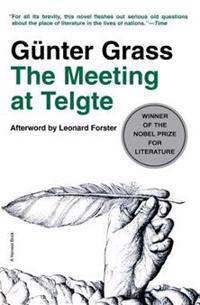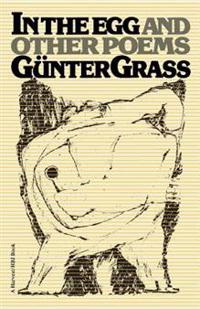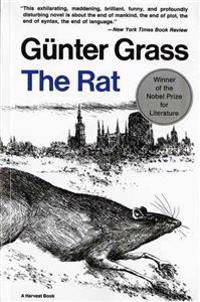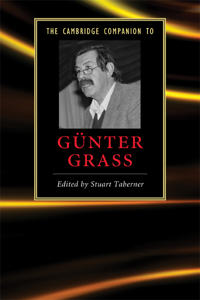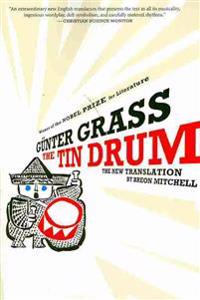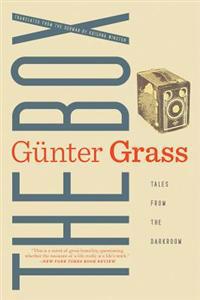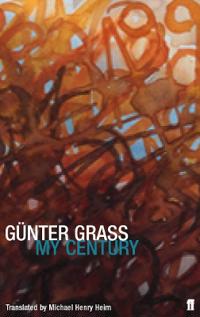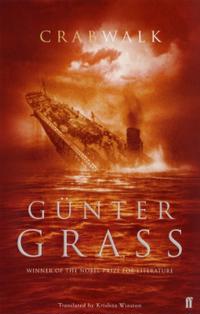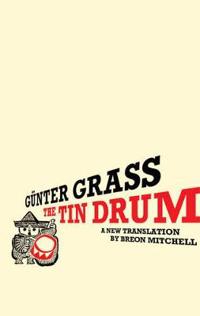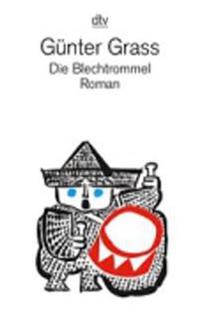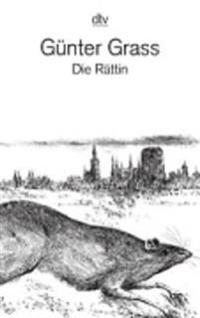The Flounder (Pocket)
avGrass, Gunter
ISBN: 9780749394851 - UTGIVEN: 1997-07-21First published in 1977, this novel is based on the fairy story "The Fisherman and his Wife". Multi-layered and laced with poetry and humour, it analyzes the battle of the sexes.[...]
Cat and Mouse (Pocket)
avGunter Grass, A. Leslie (EDT) Willson, Gunter Grass
ISBN: 9780826407337 - UTGIVEN: 1994-09For many years, Gunter Grass (born 1927) has been one of the world's most vital literary figures. From the publication of The Tin Drum through his latest pleas for sane government and civil treatment of Germany's "foreign citizens" in the 1990s, Grass has been at the forefront of both literary and p[...]
The Tin Drum (Storpocket)
avGunter Grass
ISBN: 9780099466048 - UTGIVEN: 2004-02The publication of The Tin Drum in 1959 launched Gunter Grass as an author of international repute. Bitter and impassioned, it delivers a scathing dissection of the years from 1925 to 1955 through the eyes of Oskar Matzerath, the dwarf whose manic beating on the toy of his retarded childhood fantast[...]
Peeling the Onion (Häftad)
avGunter Grass
ISBN: 9780099507598 - UTGIVEN: 2008-06Peeling the Onion is a searingly honest account of Grass' modest upbringing in Danzig, his time as a boy soldier fighting the Russians, and the writing of his masterpiece, The Tin Drum, in Paris. It is a remarkable autobiography and, without question, one of Gunter Grass' finest works. By the Nobel [...]
Tin Drum (Häftad)
avGunter Grass
ISBN: 9780099540656 - UTGIVEN: 2010-10On his third birthday Oskar decides to stop growing. Haunted by the deaths of his parents and wielding his tin drum Oskar recounts the events of his extraordinary life; from the long nightmare of the Nazi era to his anarchic adventures is post-war Germany.[...]
Crabwalk (Häftad)
avGunter Grass
ISBN: 9780156029704 - UTGIVEN: 200404Hailed by critics and readers alike as Gunter Grass's best book since The Tin Drum, Crabwalk is an engrossing account of the sinking of the Wilhelm Gustloff and a critical meditation on Germany's struggle with its wartime memories.
The Gustloff, a German cruise ship turned refugee carrier, was a[...]Peeling the Onion (Häftad)
avGunter Grass
ISBN: 9780156035347 - UTGIVEN: 2008-06In this extraordinary memoir, Nobel Prize-winning author Gunter Grass remembers his early life, from his boyhood in a cramped two-room apartment in Danzig through the late 1950s, when "The Tin Drum "was published.During the Second World War, Grass volunteered for the submarine corps at the age of fi[...]
The Meeting at Telgte (Häftad)
avGunter Grass
ISBN: 9780156585750 - UTGIVEN: 1990-10A group of leading intellectuals from all parts of Germany gather in 1647 for the purpose of strengthening the last remaining bond within a divided nation-its language and literature-as the Thirty Years' War comes to an end. Afterword by Leonard Forster. Translated by Ralph Manheim. A Helen and Kurt[...]
In the Egg and Other Poems (Häftad)
avGunter Grass
ISBN: 9780156722391 - UTGIVEN: 1977-04This selection combines Selected Poems (1966) and New Poems (1968). The German originals face the translations. Translated by Michael Hamburger and Christopher Middleton. A Helen and Kurt Wolff Book
[...]The Rat (Häftad)
avGunter Grass, Ralph Manhem
ISBN: 9780156758307 - UTGIVEN: 1989-05A female rat demonstrates that her species will inherit a devastated earth but will inevitably imitate the grotesque example set by human destructiveness throughout history[...]
Constructing Authorship in the Work of Gunter Grass (Inbunden)
avRebecca Braun
ISBN: 9780199542703 - UTGIVEN: 2008-06-26The Cambridge Companion to Gunter Grass (Pocket)
avStuart (EDT) Taberner
ISBN: 9780521700191 - UTGIVEN: 2009-08Gunter Grass is Germany's best-known and internationally most successful living author, from his first novel The Tin Drum to his recent controversial autobiography. He is known for his tireless social and political engagement with the issues that have shaped post-War Germany: the difficult legacy of[...]
The Tin Drum (Häftad)
avGunter Grass
ISBN: 9780547339108 - UTGIVEN: 201004"The Tin Drum," one of the great novels of the twentieth century, was published in Ralph Manheim's outstanding translation in 1959. It became a runaway bestseller and catapulted its young author to the forefront of world literature.
This fiftieth anniversary edition, translated by Breon
Mitche[...]The Box: Tales from the Darkroom (Häftad)
avGunter Grass
ISBN: 9780547577647 - UTGIVEN: 2011-10"It is impossible not to be impressed by Grass's] inexhaustible desire to experiment with the novel and by the many good stories and passages of exquisite writing in "The Box.""--Charles Simic, "New York Review of Books"
In this inspired and daring work of fiction, Gunter Grass writes in the vo[...]My Century (Häftad)
avGunter Grass
ISBN: 9780571203123 - UTGIVEN: 2000-04Here, Gunter Grass writes of great events and seemingly trivial ones, of technical developments and scientific discoveries, of achievements in culture, sport, of megolamania, persecution and murder, war and disasters and of new beginnnings.[...]
Crabwalk (Häftad)
avGunter Grass
ISBN: 9780571216529 - UTGIVEN: 2004-04In this novel Grass examines a subject that has long been taboo - the sufferings of the Germans during World War II. He explores the sinking of the Wilhelm Gustloff, the deadliest maritime disaster of all time, and the repercussions upon three generations of a German family.[...]
Cat and Mouse (Häftad)
avGunter Grass
ISBN: 9780749394806 - UTGIVEN: 1997-03To compensate for his unusually large Adam's apple - source of both comfort and stress - 14-year-old Mahlke turns himself into an athlete and ace driver. Soon he is known to the nation as "The Great Mahlke" but remains a target to his enemies. He is different, and doomed.[...]
Tin Drum (Inbunden)
avGunter Grass
ISBN: 9781846553172 - UTGIVEN: 200910On his third birthday Oskar Matzerath resolves to stunt his own growth at three feet, and on the same day he receives his first tin drum. Wielding his drum and piercing scream as anarchic weapons, he draws forth memories from the past as well as judgements about the horrors, injustices he observes t[...]
The Tin Drum (Inbunden)
avGunter Grass
ISBN: 9781857151473 - UTGIVEN: 1993-05Hitler's rise and fall is seen through the eyes of the dwarfish narrator whose magic powers are symbolic of the grave forces dominating the German troops of that period. Grass uses magic realism to explore the dark roots of power and creativity.[...]


